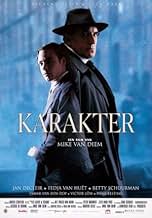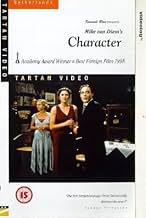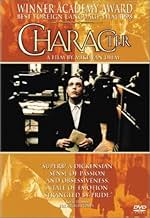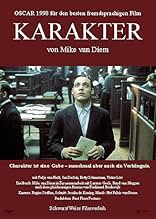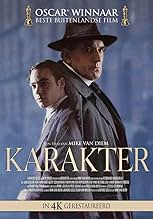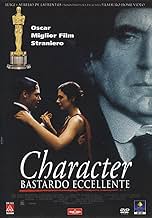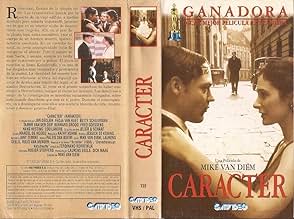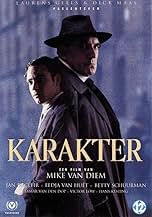CALIFICACIÓN DE IMDb
7.7/10
12 k
TU CALIFICACIÓN
Jacob Katadreuffe vive mudo con su madre, no tiene contacto con su padre que solo está en su contra y quiere convertirse en abogado, a toda costa.Jacob Katadreuffe vive mudo con su madre, no tiene contacto con su padre que solo está en su contra y quiere convertirse en abogado, a toda costa.Jacob Katadreuffe vive mudo con su madre, no tiene contacto con su padre que solo está en su contra y quiere convertirse en abogado, a toda costa.
- Dirección
- Guionistas
- Elenco
- Ganó 1 premio Óscar
- 18 premios ganados y 7 nominaciones en total
Opiniones destacadas
10gevalher
This is one of the best movies that I've seen till now. I was reluctant at first to see this movie, because it was not a "Hollywood" product, but after so many times seeing the trailer at the theater it picked my curiosity.
The story was set in Netherlands, and it develops unfolding the relationship between a father and his son. This was one of the best movies I've seen in a long time, because it touches the bottom of our hearts making thinking us (the public) about our own -sometimes- conflictive relations with our parents.
The two main stars gave us a duel as I've never saw before in a film, and to top all of this, the supporting characters were all believable as well as the magnificent locations.
This films really told a story, reflects well its age and overall has a well developed timing so you'll never lose interest in what is next, and has so many twists that your interest never decays. But I really liked the final one. This one only scene pays all the money and time you spent seeing it.
OUTSTANDING!!
The story was set in Netherlands, and it develops unfolding the relationship between a father and his son. This was one of the best movies I've seen in a long time, because it touches the bottom of our hearts making thinking us (the public) about our own -sometimes- conflictive relations with our parents.
The two main stars gave us a duel as I've never saw before in a film, and to top all of this, the supporting characters were all believable as well as the magnificent locations.
This films really told a story, reflects well its age and overall has a well developed timing so you'll never lose interest in what is next, and has so many twists that your interest never decays. But I really liked the final one. This one only scene pays all the money and time you spent seeing it.
OUTSTANDING!!
Karakter is quite stunning on several levels. The cinematography is gorgeous - without the use of any noticeable special effects or surrealistic dream sequences. The quality of the filming surpasses that of most movies.
One of the best things for me (as an American) about watching foreign films is not knowing who most of the actors are, and this makes it easier to completely accept them as the characters they play. The two leads were outstanding, and the supporting characters (particularly Betty Schuurman as Joba, and Nans Kesting as Jan Maan) were very effective.
I found the story to be engrossing and - more than anything, the pacing amazed me. A person accustomed to reading classic novels would probably appreciate the way this film unfolded. There is a desire to reach the end, but no hurry.
For sure, this film wouldn't interest everyone, but I rank it among my favorite films. It deserved to win the Academy Award for Best Picture last year: for the story, for the performances, for the direction ... it's rare that one finds a movie so well-put together.
One of the best things for me (as an American) about watching foreign films is not knowing who most of the actors are, and this makes it easier to completely accept them as the characters they play. The two leads were outstanding, and the supporting characters (particularly Betty Schuurman as Joba, and Nans Kesting as Jan Maan) were very effective.
I found the story to be engrossing and - more than anything, the pacing amazed me. A person accustomed to reading classic novels would probably appreciate the way this film unfolded. There is a desire to reach the end, but no hurry.
For sure, this film wouldn't interest everyone, but I rank it among my favorite films. It deserved to win the Academy Award for Best Picture last year: for the story, for the performances, for the direction ... it's rare that one finds a movie so well-put together.
is a real shame that this kind of movies have to be discovered 3 or 4 years since the release (most dont find their way to theaters) i know that people in the entertainment business are in just for the sake of money, but if they dont want to invest in producing quality movies (books,music etc) at least have to be more open in let these great movies have a decent distribution in the states.
It is not too frequent that we get Dutch programmes of films or TV-minis in this corner of Europe, and when they do appear it is thanks to the regional Basque TV Station `EITB'. Indeed over two years has passed since seeing the excellent mini `Charlotte Sophie Bentinck' (1996) (qv) and seeing the very interesting `Karakter' recently.
Set in the 1920's this film has excellent mise-en-scéne wonderfully photographed, mostly in Holland and Belgium, but with some scenes shot in Wroclaw, Poland, with street-cars of the times, in which the darkened almost greyish brickwork of the tenement buildings and the industrial port areas takes on an intense protagonism in the film's development. Palais van Boem's musical contribution is mostly just right, though at times seemed to be a little boorish.
A young, illegitimate boy grows up with his unmarried mother, whilst the father, Dreverhaven, continuously appeals to her to marry him, but always rejected. However, the father seems to do everything possible to disrupt the young man's life, as his mother becomes more and more detached and uncaring. It would seem that Dreverhaven is playing out a real-life game of chess around his son Jacob, as if trying to corner him into submission and apathy, but which the young man manages to survive. The psychological impression is that one or the other would undo his `bitter foe', but that despite the father's vast fortune and power the struggle of will would rebound against him.But as the Dutch saying goes: De één zijn dood, is de ander zijn brood'
This is no `thriller' in the ordinary sense, more a psychological suspense which requires attention throughout. The acting is magnificent: both Fedja van Huêt and Jan Decleir play out their parts with just the right touch, especially Decleir, and Lou Landré as Rentenstein is almost spellbinding, not to be missed.
Here is another example of the unarguable fact: here in Europe we make cinema, not blockbuster box-office hits.
Set in the 1920's this film has excellent mise-en-scéne wonderfully photographed, mostly in Holland and Belgium, but with some scenes shot in Wroclaw, Poland, with street-cars of the times, in which the darkened almost greyish brickwork of the tenement buildings and the industrial port areas takes on an intense protagonism in the film's development. Palais van Boem's musical contribution is mostly just right, though at times seemed to be a little boorish.
A young, illegitimate boy grows up with his unmarried mother, whilst the father, Dreverhaven, continuously appeals to her to marry him, but always rejected. However, the father seems to do everything possible to disrupt the young man's life, as his mother becomes more and more detached and uncaring. It would seem that Dreverhaven is playing out a real-life game of chess around his son Jacob, as if trying to corner him into submission and apathy, but which the young man manages to survive. The psychological impression is that one or the other would undo his `bitter foe', but that despite the father's vast fortune and power the struggle of will would rebound against him.But as the Dutch saying goes: De één zijn dood, is de ander zijn brood'
This is no `thriller' in the ordinary sense, more a psychological suspense which requires attention throughout. The acting is magnificent: both Fedja van Huêt and Jan Decleir play out their parts with just the right touch, especially Decleir, and Lou Landré as Rentenstein is almost spellbinding, not to be missed.
Here is another example of the unarguable fact: here in Europe we make cinema, not blockbuster box-office hits.
In the 20's, in Netherlands, Jacob Willem Katadreuffe (Fedja van Huêt) has just concluded the law school and has an argument with the High Court Enforcement Officer Dreverhaven (Jan Decleir) at his office. Katadreuffe leaves the place covered in blood. On the next morning, he is arrested by the police for the murder of Dreverhaven. He claims that he is innocent and discloses the story of his life to the Chief of Police.
His mother Joba (Betty Schuurman) was the maid at Dreverhaven. One night, she is raped by him and a couple of weeks later she learns that she is pregnant. Dreverhaven proposes to marry her but Joba quits her job and leaves his house. Along the years, Katadreuffe is bullied at school and called bastard by his mates and his mother never talks to him. One day, he is involved by other kids in a theft of bread and arrested by the police. When he calls his biological father to help him, Dreverhaven tells the police that he does not know who Katadreuffe is. The boy is intelligent and learns English reading a superseded and incomplete edition of encyclopedia that was left behind by the previous tenants of his apartment. Katadreuffe is also ambitious and asks for a job in a law office, where he becomes the protégé of his mentor De Gankelaar (Victor Löw). Soon he falls in unrequited love with the secretary Lorna Te George Victor (Tamar van den Dop). Along the years, Dreverhaven uses his power to harm him. When he concluded his course, he decides to pay a visit to Dreverhaven to tell him that he has wined their dispute. May Katadreuffe have killed Dreverhaven?
"Karakter" is a dark film about a young man needy of fatherly love. The intercourse between his parents is never clear whether it was a rape, as per the trailer, or consensual sex. In the view of Katadreuffe, his mother has always been "mute". But maybe it could be a trauma for her only intercourse since she is a stubborn woman. Dreverhaven is a mysterious and ambiguous character. Is he only cruel or is he trying to harden his son to face the challenges of the brutal society where they live and be a winner? The screenplay is very well-written and keeps the attention of the viewer until the last scene. The cinematography, set decoration and art direction are perfect and bring the viewer to Netherlands in the middle 20's. The cast has magnificent performance highlighting Jan Decleir. My vote is eight.
Title (Brazil): "Caráter" ("Character")
His mother Joba (Betty Schuurman) was the maid at Dreverhaven. One night, she is raped by him and a couple of weeks later she learns that she is pregnant. Dreverhaven proposes to marry her but Joba quits her job and leaves his house. Along the years, Katadreuffe is bullied at school and called bastard by his mates and his mother never talks to him. One day, he is involved by other kids in a theft of bread and arrested by the police. When he calls his biological father to help him, Dreverhaven tells the police that he does not know who Katadreuffe is. The boy is intelligent and learns English reading a superseded and incomplete edition of encyclopedia that was left behind by the previous tenants of his apartment. Katadreuffe is also ambitious and asks for a job in a law office, where he becomes the protégé of his mentor De Gankelaar (Victor Löw). Soon he falls in unrequited love with the secretary Lorna Te George Victor (Tamar van den Dop). Along the years, Dreverhaven uses his power to harm him. When he concluded his course, he decides to pay a visit to Dreverhaven to tell him that he has wined their dispute. May Katadreuffe have killed Dreverhaven?
"Karakter" is a dark film about a young man needy of fatherly love. The intercourse between his parents is never clear whether it was a rape, as per the trailer, or consensual sex. In the view of Katadreuffe, his mother has always been "mute". But maybe it could be a trauma for her only intercourse since she is a stubborn woman. Dreverhaven is a mysterious and ambiguous character. Is he only cruel or is he trying to harden his son to face the challenges of the brutal society where they live and be a winner? The screenplay is very well-written and keeps the attention of the viewer until the last scene. The cinematography, set decoration and art direction are perfect and bring the viewer to Netherlands in the middle 20's. The cast has magnificent performance highlighting Jan Decleir. My vote is eight.
Title (Brazil): "Caráter" ("Character")
¿Sabías que…?
- TriviaAlthough the story takes place in the Dutch city of Rotterdam, many scenes were filmed in other cities across The Netherlands and Europe. This was because Rotterdam has very few buildings from this era left following heavy bombing during the Second World War. Filming locations included: Hamburg (Germany), Wroclaw (Poland), Antwerp and Ghent (Belgium) and The Hague (The Netherlands).
- ErroresIn one of the street scenes, you can see an extra in modern outfit and with no headwear on.
- Citas
Joba: Why don't you leave our boy in peace?
Dreverhaven: I'll strangle him for nine-tenths, and the last tenth will make him strong.
Selecciones populares
Inicia sesión para calificar y agrega a la lista de videos para obtener recomendaciones personalizadas
- How long is Character?Con tecnología de Alexa
Detalles
- Fecha de lanzamiento
- Países de origen
- Sitio oficial
- Idiomas
- También se conoce como
- Character
- Locaciones de filmación
- Wroclaw, Baja Silesia, Polonia(Miernicza 27, Wroclaw, Dolnoslaskie, Poland)
- Productoras
- Ver más créditos de la compañía en IMDbPro
Taquilla
- Presupuesto
- USD 4,500,000 (estimado)
- Total en EE. UU. y Canadá
- USD 623,983
- Fin de semana de estreno en EE. UU. y Canadá
- USD 37,268
- 29 mar 1998
- Total a nivel mundial
- USD 623,983
- Tiempo de ejecución
- 2h 2min(122 min)
- Color
- Mezcla de sonido
- Relación de aspecto
- 1.85 : 1
Contribuir a esta página
Sugiere una edición o agrega el contenido que falta


